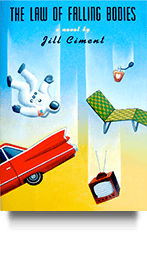“A beautiful, one-of-a-kind novel.” ~Carolyn See, The Los Angeles Times
“The Law of Falling Bodies is an American original. It’s a lethal comedy about the simultaneous grandeur and cheesiness of our dreams, told in language precise and glittering as a spray of diamonds.” ~ Michael Cunningham
“It’s hard not to compare “The Law of Falling Bodies,” Jill Ciment’s radiant first novel, with Mona Simpson’s “Anywhere but Here” (1986). Both novels feature impossible, eccentric mothers, who are blinded by the glitter of their own fickle dreams, and their conflicted daughters, torn between filial devotion and a desperate need to make independent lives of their own. Both take place on the road to and in California. And both mark the debuts of writers blessed with an uncommon gift for language.
“Falling Bodies” isn’t as ambitious a book as “Anywhere but Here”: it doesn’t tackle a whole slice of contemporary history or attempt to reinvent traditional literary myths, as Ms. Simpson’s remarkable novel did. Instead, Ms. Ciment (pronounced sih-MENT) contents herself with telling the whimsical story of a single mother and daughter. Yet in fulfilling her modest aims, the book completely beguiles the reader. It is sad, funny and affecting, completely assured in its portrayal of the complicated mathematics of family emotions: one of those novels you want to mail to friends.
Told in first person, “Falling Bodies” is the story of Kimberly and her efforts to come to terms with her mother, Gloria. Gloria Gail – the name seems meant to recall Dorothy Gael, who crossed the rainbow to Oz – is one of those inveterate dreamers, who’s convinced that a gold mine lies just beyond the horizon, that a jackpot has just eluded her reach. She’s a kind of female Gatsby, someone eerily attuned to the romantic possibilities of life.
“My mother didn’t care about a bigger house or a swimming pool,” Kim recalls. “Possessions, in point of fact, held no interest whatsoever for her. What my mother was after, had always been after, was something outside of material gain, something that rendered the big house empty, the pool drained of meaning. I’d seen my mother standing in front of a gumball machine with prizes, as transfixed by the plastic jewelry, squirt guns and jawbreakers as Cortes was by the Aztecs’ gold. Obviously, at 44 years old, it was inconsequential to her what the machine would expel, a tutti-frutti sucker or a brass ring. Yet each time she dropped another copper penny into the slot, her breath caught.” She lived, dreamed and breathed “for those exalted moments between the promise and the prize.”
Charming, compulsive and almost endlessly hopeful, Gloria spends her days and nights drinking coffee and dreaming up schemes that run the gamut from insurance scams to pyramid games to the marketing of bizarre new products. Though she has sold Geiger counters, weight-loss potions and treadmills for pets, Gloria’s specialty is an aphrodisiac perfume. For years now, she has driven from town to town in California and Nevada, selling vials of this magic elixir from her car trunk, and she has dragged her daughter with her. By the time Kim is 15, she has attended 12 elementary schools and two junior highs. She has lived in 13 trailer parks and driven over 90,000 miles. She hopes that when the numbers on the car’s odometer reach zero again, “our lives could begin anew.”
Fate intervenes in the shape of a 40-something widower, a kind, patient man named Arthur, who one day drives smack into Kim and Gloria’s trailer. Gloria refuses to go to a hospital – she’s wanted for mail fraud and is scared of talking to the police – and Arthur sheepishly allows her and Kim to recuperate in his house.
Much to everyone’s surprise, the three soon settle into a comfortable domestic routine. Kim feels she has finally found a home. Arthur feels he has finally found a family. And Gloria, well, Gloria feels she can still come up with an idea that will bring her hope and glory.
As the weeks and months pass, however, Kim begins to fall in love with Arthur. Though she knows her mother has already shared Arthur’s bed, she makes a clumsy, girlish effort to seduce him. The following day, Arthur abruptly disappears, leaving Kim and Gloria his house. By the end of the summer, they realize he is not coming back.
Kim eventually goes off to college, gets a job and tries to begin a new life. She’s tired of her mother’s delusions, her self-absorption, her relentless scheming. Gloria, meanwhile, resumes her itinerant life as a peddler of perfume. Her ambition now is to become a guest on the new “What’s My Line” television show. She dreams of stumping the panel and becoming a cult figure, a kind of Lucille Ball.
Improbably enough, Kim meets Arthur again, and quits her job to move in with him. It is only when her mother suddenly resurfaces, desperate, needy and finally, it seems, willing to abandon her dreams, that Kim realizes she cannot escape her past, that she may very well have to choose between her mother and her new bourgeois life with Arthur.
In summary, such events may feel cartoonish and contrived, but as related by Ms. Ciment, they take on a palpable weight of emotion. There is a sweetness, as well as an acerbic humor, to her writing, and these qualities burnish the story of Gloria and Kim with a warm, affectionate glow.
Certainly, “Falling Bodies” suffers from a number of mistakes common to first novels, most notably a tendency on Ms. Ciment’s part to let her narrator recount events and emotions she could not possibly know. Such stumbles, however, never detract from the pleasures of this keenly observed and beautifully written novel.”
Books of The Times; Dreaming and Scheming With Mom
~ Michiko Kakutani


